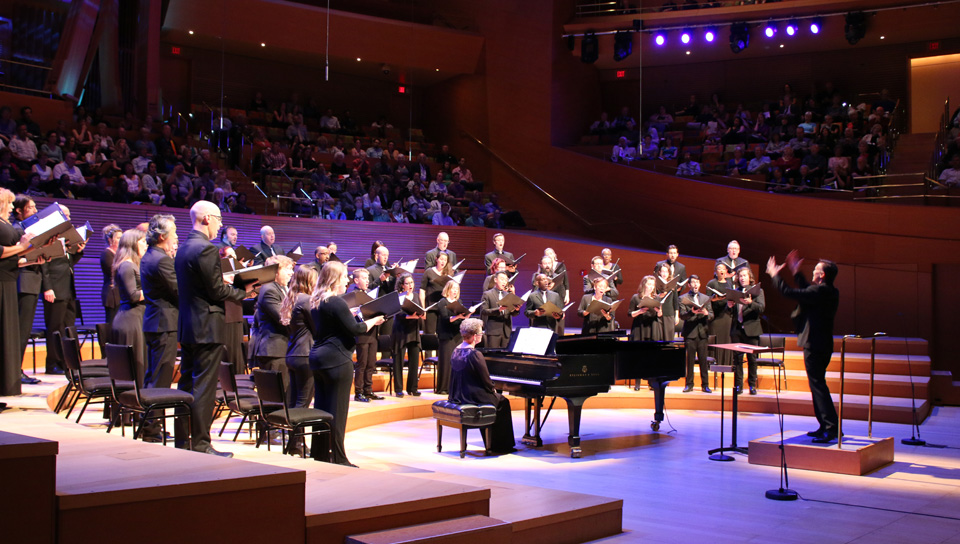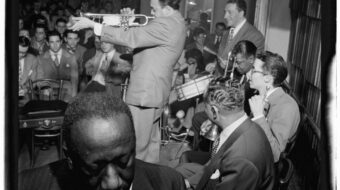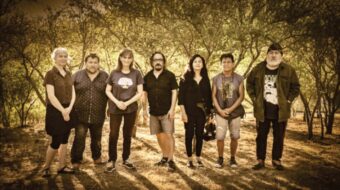
LOS ANGELES —“Oh time passes, passes on down the stream / Some days are so much sweeter / Some days, some pass like a dark dream.”
Those words come from what could be called a “new” spiritual, “Stand in That River,” text and music by Moira Smiley (b. 1976), that opened “Wade in the Water,” the Los Angeles Master Chorale’s (LAMC) concert Sunday night, named for a song many music lovers will recognize as one of the classic African American spirituals. “See that band all dressed in red / Well it looked like the band that Moses led.” Water: a potent symbol of struggle and freedom. Think crossing the Red Sea, the Jordan River, just like the tree standing by the water, tears of suffering, even, if it’s your thing, baptism.
It all started with the LAMC’s West Coast premiere a year ago of Julia Wolfe’s Pulitzer Prize-winning cantata about Pennsylvania coal miners, Anthracite Fields. On that concert, in the first half, LAMC Artistic Director Grant Gershon programmed a selection of spirituals and Appalachian folk songs heavily inflected by the haunting sound of Southern shape note singing. “Wade in the Water,” in Moses Hogan’s arrangement, appeared on that program, and Gershon says it got him thinking, “What if we built a larger program around the theme of renewal through music?”
People bring who they are to any cultural event and take from it what they need. And who I was at that moment was in plenty need of some renewal. The day before was the exhausting People’s Climate March, and the next day would be May Day, another long walk for freedom.
But I was not alone in my need. Spirituals are not simply an important part of American music—it’s impossible to imagine our music without them—but, according to Arthur C. Jones, author of Wade in the Water: The Wisdom of the Spirituals, “a broad-ranging cultural tradition that remains relevant to pressing present-day social realities.”
Moira Smiley was thinking along the same lines when she wrote “Stand in That River”: “I believe strongly in the power of people coming together and in singing,” she says of her piece. “It is so important that we keep reaffirming how we are connected—especially when there are forces around us saying we should be separate.” When the concert began and Gershon had mounted the stage, no chorus was in sight: Then the four sections—sopranos, altos, tenors and basses—unhurriedly approached the stage from the four corners of Walt Disney Concert Hall, the separate joining together as one ensemble. “Tell me sister, tell me brother, / Where does that river flow? / It flows down to the great water, / where soon my people will go.”
I couldn’t stop thinking about some recent losses of friends—Leslie Gersicoff of the West Coast Jewish Labor Committee, Oneil Cannon, Stuart Timmons and Armando Ramirez—all of whom stayed in the struggle to the very end. We need this music to keep going.
A traditional Appalachian song on the program, arranged dreamily by Shawn Kirchner, was “Bright Morning Stars”—“Bright morning stars are rising, / Day’s a-breaking in my soul…Oh where are our dear children, / They’re upon the earth a-dancing. / Day’s a-breaking in my soul.” There was a contemporary political folk group in the 1980s that included Charlie King and George Fulginiti-Shakar and others. They toured, released albums, kept our spirits buoyant for a decade or so during the Reagan years. They called themselves Bright Morning Star, and that was their signature number. What sustenance some of those old songs can give us yet!
So it was with “Amazing Grace,” in a familiar setting by popular arrangers Alice Parker and Robert Shaw, the song President Obama led from the podium when he memorialized the nine African Americans slaughtered at prayer in Charleston, South Carolina. We need these songs; we need to sing together.
The concert was not all spirituals. Mixed in were other pieces of European origin that also delved deep into cultural roots for renewal. The centerpiece was English composer Ralph Vaughan Williams’ Mass in G Minor, which drew on the early Renaissance traditions best captured in Tudor England by William Byrd and Thomas Tallis. His a cappella setting of the Catholic mass, in Latin, dates from 1921 and features the chorus divided into eight parts plus four soloists. Vaughan Williams had served on the front in France during World War I in an ambulance unit. The Mass, placid and reflective, conveys his somber experience. In fact, he himself was an atheist. It closes with the well-known phrase “Agnus Dei, qui tollis peccata mundi, dona nobis pacem—Lamb of God, who takes away the sins of the world, grant us peace.” I wonder if Vaughan Williams knew about that amazing Silent Night on the first Christmas of the war, when soldiers from opposing sides put down their weapons against their commanders’ orders, in a sign of good will to all men.
Another composition drew on medievalist sonorities, French composer Maurice Duruflé’s “Ubi Caritas”—“Where there is charity and love, God is there…Let us rejoice and be glad of it..And from a sincere heart let us love one another.” Comrade Che Guevara, whose death in combat 50 years ago we mark this coming October, put it in different words but with a similar meaning: “The true revolutionary is guided by a great feeling of love. It is impossible to think of a genuine revolutionary lacking this quality.” I don’t know if Che was an atheist or not, but believers from various traditions have embraced the values of Liberation Theology. A belief in God is not required to understand the profound human messaging in these texts.
Another standout that mixes traditional with modern elements is Seoul-based composer Hyo-won Woo, whose “Cum Sancto Spiritu” combines the Korean musical scale with a Latin text from the Gloria. Her music is a bouncy, post-minimalist affair that is a wonderment to the ear. I hope we hear more from her sometime soon.
Rollo Dilworth’s “Rockin’ Jerusalem” reflects his belief “that Christ wasn’t just about the heaven that was to come but was also preaching about the heaven that we could experience on earth, if we learned to get along with each other and learned to treat people equally.” “Oh Mary, oh Martha, / Oh Mary, ring them bells.” It was a sort of swingin’ gospel vision of joy folk music lovers appreciate in “If I Had a Hammer (If I Had a Bell).”
The sliding barbershop chords in Moses Hogan’s arrangement of the standard hymn “Abide with Me” made for a perfect little choral gem.
The best received piece of the evening was a new arrangement by chorus member and soloist Zanaida Robles (she sang a most beautiful solo in the title song of the concert). That was the so-called Black American anthem “Lift Ev’ry Voice and Sing,” by brothers James Weldon Johnson and J. Rosamond Johnson, dating originally back to 1905, a time when hundreds of thousands of Black Americans had living memories of slavery. Before the performance, Gershon asked the audience to really take these magnificent lyrics to heart on this 25th anniversary of the Rodney King verdict in 1992 that led to the historic L.A. urban rebellion. Robles’ vision of this song is so exciting, bringing out the threatening harmonies of strife and struggle, and the bright, exultant marching tonalities of hope. The first two verses are as follows:
Lift ev’ry voice and sing
Till earth and heaven ring.
Ring with the harmonies of Liberty.
Let our rejoicing rise
High as the listening skies;
Let it resound loud as the rolling sea.
Sing a song full of the faith that the dark past has taught us;
Sing a song full of the hope that the present has brought us.
Facing the rising sun of our new day begun,
Let us march on till victory is won.
Stony the road we trod,
Bitter the chastening rod,
Felt in the days when hope unborn had died;
Yet with a steady beat, have not our weary feet
Come to the place for which our fathers sighed?
We have come over a way that with tears has been watered.
We have come, treading our path through the blood of the slaughtered,
Out from the gloomy past,
Till now we stand at last
Where the white gleam of our bright star is cast.
Robles says this is “a song for everyone and validates the struggle for justice. It speaks to anyone who has experienced oppression or injustice and is especially relevant in today’s social and political climate.” Personally, I would say, it’s a worthy candidate to be considered as a replacement for “The Star-Spangled Banner,” whose racist and militarist lyrics I will not sing anymore.
This was a concert for weary souls in need of an outstretched hand. Its reverberations will linger in our marching step.

MOST POPULAR TODAY

High Court essentially bans demonstrations, freedom of assembly in Deep South

U.S. imperialism’s ‘ironclad’ support for Israel increases fascist danger at home

Resource wars rage in eastern Congo, but U.S. capitalism only sees investment opportunity


UN warns that Israel is still blocking humanitarian aid to Gaza






Comments